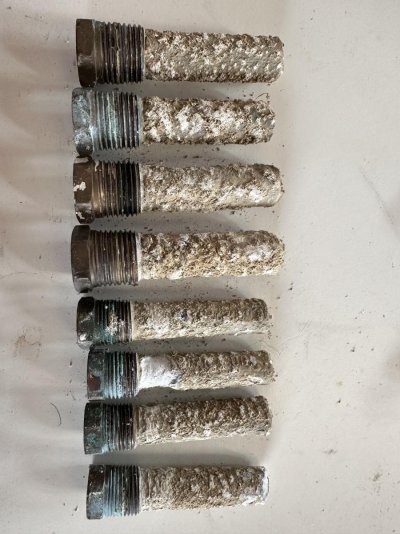- Joined
- Mar 17, 2012
- Messages
- 4,406
- Location
- Australia
- Vessel Name
- Insequent
- Vessel Make
- Ocean Alexander 50 Mk I
I have just replaced engine and oil cooler anodes. They all look similar, with a crusty substance that I assume is a hydrated zinc oxide or similar substance. One of the cooler anodes, which are about 1cm in diameter, had material dislodged on removal. Scraping that with the end of a screwdriver removed more of this material, which is soft and crumbly, revealed a hard zinc metal core of about 4-5mm. My question is, are they still working as anodes are supposed to work?
These anodes had been in use for 16 months. The ones before that looked the same and had been in use for 14 months. My home berth is near the Brisbane CBD, about 12nm upstream from where the river enters Moreton Bay. At the river mouth salinity is 30 psu, regarded as an even mix of river (fresh) water and ocean water. So water is obviously "brackish" at my marina. But I do anchor out in the Bay, saltwater quite a lot. At least 75 nights per year. So using magnesium anodes isn't advisable, they'd be gone very quickly. Should I be using aluminium anodes instead of zinc anodes?
These anodes had been in use for 16 months. The ones before that looked the same and had been in use for 14 months. My home berth is near the Brisbane CBD, about 12nm upstream from where the river enters Moreton Bay. At the river mouth salinity is 30 psu, regarded as an even mix of river (fresh) water and ocean water. So water is obviously "brackish" at my marina. But I do anchor out in the Bay, saltwater quite a lot. At least 75 nights per year. So using magnesium anodes isn't advisable, they'd be gone very quickly. Should I be using aluminium anodes instead of zinc anodes?
Attachments
Last edited:



